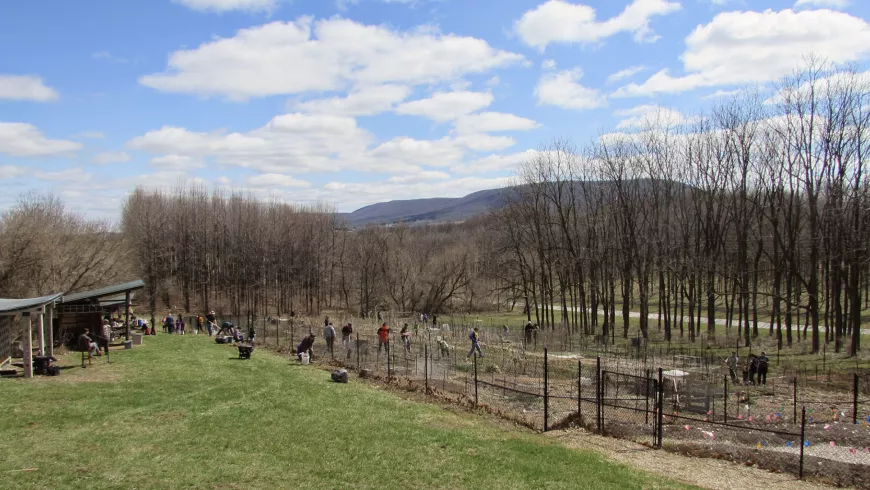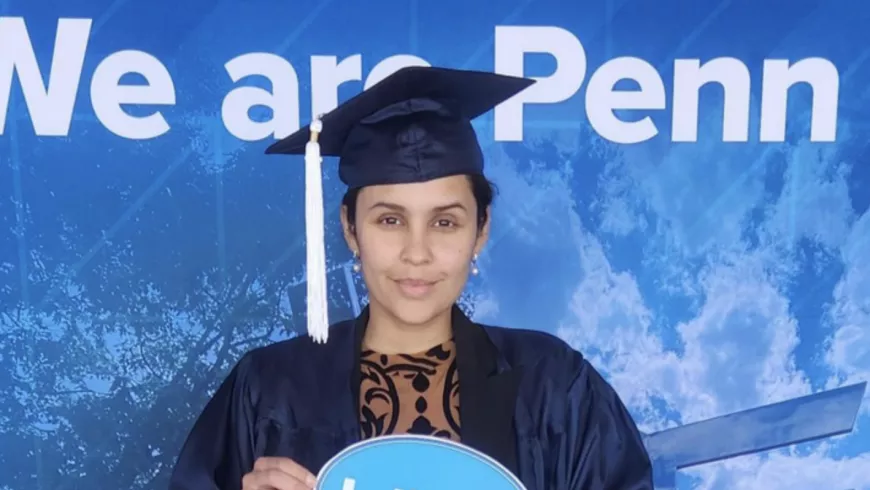100% Online
Complete your Penn State course work at your own pace and 100% online.
Application deadline
Credits and costs
Stackable Credentials
This program is embedded within the Master of Professional Studies in Renewable Energy and Sustainability Systems.
Gain Sustainability Management and Policy Skills
Analyze market and non-market conditions for renewable energy enterprise, sustainable technology, sustainable practices, and product development.
Identify and communicate key policy features for renewable energy and environmental sustainability pathways.
Address and assess key features of coupled human-environment systems.
Create business plans for the adoption and deployment of technologies to address critical challenges in sustainability of global natural resources.
Develop, manage, and improve manufacturing processes, corporate practices, corporate social responsibility, and commercial products to enhance the long-term sustainability of an organization.
Online Sustainability Graduate Certificate Courses
Online Sustainability Graduate Certificate Courses
These sustainability program courses offer a balanced view of the various dimensions of sustainability, discussing technological, environmental, economic, societal, and political aspects of sustainable energy solutions.
You can prepare to lead sustainability projects in both corporate settings and within government entities by studying such topics as:
- the evaluation of energy policy challenges and the crafting of policy alternatives to meet economic, environmental, and social goals
- energy resource availability, including current energy markets and forecast scenarios, and the technology processes used for conversion
- the identification and characterization of leading stakeholders, including energy producers, professional associations, and interest groups across different energy sectors
- the technical and economic understanding of sustainability technologies and systems, and the assessment of their impacts using social, environmental, and economic metrics
- the creation of business opportunities for innovations that strategically target true sustainability needs and help to reinvent an organization within the marketplace
Required Courses (12 credits)
- 3credits
This course explores sustainability as a business opportunity for developing innovative products and services. It will focus on consumer needs related to sustainability, willingness to pay for these needs, and the innovative processes necessary to create sustainable solutions.
- 3credits
Provides in-depth exploration of energy policy development, implementation, and assessment at multiple governmental and corporate scales, with emphasis on energy markets.
- 3credits
Industry perspective on the resources, technologies, engineering approaches, and externalities involved in deploying renewable energy businesses profitably and sustainably.
- 3credits
This course examines strategies and applications of sustainable technologies in manufacturing, energy, water, transportation, food, and building systems.
Using Stackable Certificate Credits toward a Master’s Degree
As part of the stackable pathway, the courses required for this 12-credit certificate can apply to the Master of Professional Studies in Renewable Energy and Sustainability Systems if you apply and are accepted into the program. If you have been accepted into this certificate program, you will not be charged an additional fee to apply for the Master of Professional Studies in Renewable Energy and Sustainability Systems program.
Courses may also apply to other degree programs. Students should contact their adviser to discuss transfer credit policies and application fees and details.
Students earn the graduate certificate by successfully completing each course with a grade of C or better; however, students must earn a grade of B- or better to apply those successfully completed courses toward the master’s degree.
Course Availability
If you're ready to see when your courses will be offered, visit our public LionPATH course search (opens in new window) to start planning ahead.
Start or Advance Your Career

Start or Advance Your Career
You can use the knowledge gained from this program and the support of Penn State career resources to pursue careers in a variety of fields, depending on your goals.
Career Opportunities for Graduates
This sustainability graduate certificate can prepare working professionals to implement policies and regulations and perform strategic planning as part of a larger work of sustainability management in both corporate settings and within government entities.
You can learn to evaluate the interaction between policy decisions, environmental outcomes, societal settings, and energy markets, helping you to become more conversant in diverse, industry-relevant topics. The courses in this program offer preparation for careers in management that concern issues of sustainability and energy resources, including:
- sustainability coordinator
- project manager for sustainability projects
- chief sustainability officer
- renewable energy manager
- sustainability engineer
- sustainability analyst
Career Services to Set You Up for Success

From the day you're accepted as a student, you can access resources and tools provided by Penn State World Campus Career Services to further your career. These resources are beneficial whether you're searching for a job or advancing in an established career.
- Opportunities to connect with employers
- Career counselor/coach support
- Occupation and salary information
- Internships
- Graduate school resources
Ready to Learn More?
Get the resources you need to make informed decisions about your education. Request information on this program and other programs of interest by completing this form.
Ready to take the next step toward your Penn State graduate certificate?
Costs and Financial Aid
Costs and Financial Aid
Learn about this program's tuition, fees, scholarship opportunities, grants, payment options, and military benefits.
Costs and Financial Aid
Graduate Tuition
Graduate tuition is calculated based on the number of credits for which you register. Tuition is due shortly after each semester begins and rates are assessed every semester of enrollment.
2024–25 Academic Year Rates
| How many credits do you plan to take per semester? | Cost |
|---|---|
| 11 or fewer | $1,027 per credit |
| 12 or more | $12,325 per semester |
2025–26 Academic Year Rates
| How many credits do you plan to take per semester? | Cost |
|---|---|
| 11 or fewer | $1,037 per credit |
| 12 or more | $12,448 per semester |
Paying for Your Certificate
Students pursuing a certificate are considered "nondegree," a status that is not eligible for federal student aid, including the Federal Direct Stafford Loan program. A private alternative loan may be an option to consider.
Additionally, Penn State offers many ways to pay for your education, including an installment plan and third-party payments. Penn State World Campus also offers an Employer Reimbursement and Tuition Deferment Plan. Learn more about the options for paying for your education.
Students pursuing a degree and meeting all other eligibility requirements may qualify for financial aid.
Military Benefits
Military service members, veterans, and their spouses or dependents should explore these potential military education benefits and financial aid opportunities, as well.
Additional Cost of Attendance Details
To view the detailed list of cost of attendance elements:
- visit the Tuition Information site
- click the plus sign to expand the table
- select a semester from the World Campus row
Technical Requirements
Review the technical requirements for this program.
Earn Stackable Credentials on the Way to a Master's Degree

Earn Stackable Credentials on the Way to a Master's Degree
This certificate can serve as a stand-alone credential and as a step on your journey toward the Penn State Master of Professional Studies in Renewable Energy and Sustainability Systems. Stackable credentials recognize your new skills and knowledge while you work toward your master's degree — with no additional application fees.
Earning graduate certificates from Penn State World Campus is a great way to gain new skills and quickly add valuable credentials to your résumé.
This graduate certificate’s courses satisfy requirements toward the following degree:
Learn to leverage technical expertise and project development skills to successfully implement renewable energy systems and sustainable business policies through the courses offered in this online degree program.
Learn more about the Master of Professional Studies in Renewable Energy and Sustainability SystemsWho Should Apply?
Who Should Apply?
This program could be right for you if you have a technical mindset and are interested in focusing on the implementation and interpretation of existing sustainability policies and regulations.
You may also be interested if you:
- want to explore future sustainability strategies within the context of changing economic, environmental, political, and societal conditions
- wish to further excel in your current sustainability-oriented job
- are looking to better define yourself within the growing sustainability management sector
Set Your Own Pace

Set Your Own Pace
Whether you are looking to finish your program as quickly as possible or balance your studies with your busy life, Penn State World Campus can help you achieve your education goals. Many students take one or two courses per semester.
Our online courses typically follow a 12- to 15-week semester cycle, and there are three semesters per year (spring, summer, and fall). If you plan to take a heavy course load, you should expect your course work to be your primary focus and discuss your schedule with your academic adviser.
To Finish Your Certificate in One Year
- Take 2 courses each semester
To Finish Your Certificate in Two Years
- Take 1 course each semester
Timelines may vary based on course availability.
Convenient Online Format
This program's convenient online format gives you the flexibility you need to study around your busy schedule. You can skip the lengthy commute without sacrificing the quality of your education and prepare yourself for more rewarding career opportunities without leaving your home.
A Trusted Leader in Online Education

Penn State has a history of more than 100 years of distance education, and World Campus has been a leader in online learning for more than two decades. Our online learning environment offers the same quality education that our students experience on campus.
Information for Military and Veterans

Are you a member of the military, a veteran, or a military spouse? Please visit our military website for additional information regarding financial aid, transfer credits, and application instructions.
How to Apply to Penn State

How to Apply to Penn State
Apply by April 20 to start May 19
Application Instructions
Deadlines and Important Dates
Complete your application and submit all required materials by the appropriate deadline. Your deadline will depend on the semester you plan to start your courses.
Summer Deadline
Apply by April 20 to start May 19Fall Deadline
Apply by July 20 to start August 25Spring Deadline
Apply by December 10 to start January 12
Steps to Apply
For admission to the J. Jeffrey and Ann Marie Fox Graduate School, an applicant must hold either (1) a baccalaureate degree from a regionally accredited U.S. institution or (2) a tertiary (postsecondary) degree that is deemed comparable to a four-year bachelor's degree from a regionally accredited U.S. institution. This degree must be from an officially recognized degree-granting institution in the country in which it operates.
You will need to upload the following items as part of your application:
Official transcripts from each institution attended, regardless of the number of credits or semesters completed. Transcripts not in English must be accompanied by a certified translation. If you are a Penn State alum, you do not need to request transcripts for credits earned at Penn State but must list Penn State as part of your academic history.
English Proficiency — The language of instruction at Penn State is English. With some exceptions, international applicants must take and submit scores for the Test of English as a Foreign Language (TOEFL) or International English Language Testing System (IELTS). Minimum test scores and exceptions are found in the English Proficiency section on the Fox Graduate School's "Requirements for Graduate Admission" page. Visit the TOEFL website for testing information. Penn State's institutional code is 2660.
Test Scores — GRE and GMAT test scores are NOT required.
To begin the online application, you will need a Penn State account.
Create a New Penn State Account
If you have any problems during this process, contact an admissions counselor at [email protected].
Please note: Former Penn State students may not need to complete the admissions application or create a new Penn State account. Please visit our Returning Students page for instructions.
Stackable Credentials Application Fee Waiver
If you have been previously accepted to a program with stackable credentials, you will not be charged an additional application fee for any associated programs.
Associated programs in the renewable energy and sustainability systems stack include:
Certificates:
- Graduate Certificate in Sustainable Energy Development
- Graduate Certificate in Energy Transition Strategies
- Graduate Certificate in Solar Energy
- Graduate Certificate in Sustainability Management and Policy
Degree:
- Master of Professional Studies in Renewable Energy and Sustainability Systems
If you begin with a certificate and are interested in pursuing the Master of Professional Studies in Renewable Energy and Sustainability Systems, work with your adviser while completing your first certificate to determine which program to apply to next.
Up to 15 credits earned in any of these certificate programs may be transferred to the master's degree in renewable energy and sustainability systems, subject to restrictions outlined in GCAC-309 Transfer Credit.
You can begin your online application at any time. Your progress within the online application system will be saved as you go, allowing you to return at any point as you gather additional information and required materials.
- Choose Enrollment Type: "Certificate Admission"
- Choose "WORLD CAMPUS" as the campus
Checking Your Status
You can check the status of your application by using the same login information established for the online application form.6. Complete the application.
Admissions Help
If you have questions about the admissions process, contact an admissions counselor at [email protected].
Contact Us

Contact Us
Have questions or want more information? We're happy to talk.
Our student services and program specialists are available now to help you with your application and to answer any questions you have about our graduate programs in Renewable Energy and Sustainability Systems (RESS). Please contact us with anything you wish to discuss.
Noelle Capparelle
MPS-RESS Program Assistant
[email protected]
Phone: 814-867-5401
For general questions about Penn State World Campus, please contact:
World Campus Admissions Counselors
Phone: 814-863-5386
[email protected]
Learn from the Best
Learn from the Best
Learn from expert faculty who are leaders in the field. Our highly relevant, dynamic curriculum is taught by distinguished faculty who have special training and experience teaching in an online environment. You can expect the same caliber of academic quality that you associate with Penn State.
To see more detailed information about the renewable energy and sustainability systems portfolio, visit the RESS program website. You can also visit the Open Educational Resources website to preview the courses offered online by the Department of Energy and Mineral Engineering.
Faculty
Erich Schienke
- DegreePh.D., Science and Technology Studies, Rensselaer Polytechnic Institute
- DegreeM.S., Science and Technology Studies, Rensselaer Polytechnic Institute
- DegreeB.A., Technology Studies, Hampshire College
Dr. Erich Schienke's research and teaching interests are in the areas of energy policy, renewable energy systems design and implementation, ethical dimensions of renewable energy and sustainability systems, sustainability indicators, ESG, and workforce requirements needed to meet the demands of the rapidly growing renewable energy industry. He has published in multiple peer-reviewed journals and edited volumes, which have received more than 250 citations across a range of topics, including climate risk management, ethics and sustainability, and ecological governance.
Mark Fedkin
- DegreePh.D., Geo-Environmental Engineering, Penn State
- DegreeM.S., Geo-Environmental Engineering, Penn State
- DegreeB.S., Geology, Moscow State University (Russia)
Dr. Mark Fedkin is an assistant teaching professor and a lead faculty member in the renewable energy and sustainability systems graduate online program. He has worked for more than ten years for the Earth and Mineral Sciences Energy Institute, where he led experimental research on electrochemical energy systems and processes, including fuel cells, hydrogen technologies, electrophoresis, and corrosion in extreme environments. During his career as an experimentalist, Dr. Fedkin developed a number of methods and technologies for monitoring and sensing the environmental parameters in both simulated and natural settings.
Brandi Robinson
- DegreeM.S., Geography, Penn State
- DegreeB.A., Environmental Studies and Geography, University of Pittsburgh
Brandi Robinson is an associate teaching professor in the John and Willie Leone Family Department of Energy and Mineral Engineering, where she is the lead faculty for the energy and sustainability policy program and teaches in the renewable energy and sustainability systems program. Brandi is the director of Online Education for the department, as well. She serves as co-director for Penn State’s Local Climate Action Program, which many ESP and RESS students participate in, and she is also active in local climate work. She chairs the Technical Advisory Group for the implementation of the region’s climate action and adaptation plan. Brandi also serves on the Faculty Senate, where she is working to integrate sustainability throughout more undergraduate curricula.
Andy James
DegreeB.S., Marketing, Penn StateAndy James is course author and instructor of Sustainability-Driven Innovation. In addition to his role at Penn State, he is vice president, corporate strategy at New Pig. He has more than 10 patents pending for his work in understanding and resolving environmental risks from industrial spills. Prior experience includes his time as senior manager at Olson Zaltman, where he provided consumer behavior research and brand strategy consulting to brands including Audi, T. Rowe Price, and MillerCoors.



